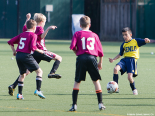Dealing With Players That Are Too "Unselfish"

This resource stems from a question submitted to the Ask PCA blog. Responses come from our experts including PCA Trainers, who lead live group workshops for coaches, parents, administrators and student-athletes.
"The best scorer on the middle-school team I coach often defers on easy scoring chances to pass to teammates. Of course, I respect such "unselfishness," but players and coaches alike want the points this player could produce. What should we do?"
PCA Response By Ray Lokar, PCA Trainer – Los Angeles
I have certainly had a few players who were unselfish to a fault. Trust that it is a much better "problem" to have than the reverse situation, when players take too many, or bad, shots.
Often coaches will analyze a player's physical abilities and determine how they think the player should contribute, but many times roles on a team are even more a function of personalities. At times a bigger player feels more comfortable distributing, a smaller player may have a scorer's mentality, a tall player may feel more comfortable playing on the perimeter, etc.
The important thing is we teach the players the concepts of the game, and one of those is to get the best shot possible. If players are passing up a shot for a better one, then we should encourage that. However if players are passing up shots they should take, coaches need to point that out, too, and then reward players for taking the right shot even when the shot is not converted.
Finally, if confidence is an issue then that needs to be addressed, too. Deep down, players need to know the coach has unconditional confidence in their abilities. It takes some players longer than others to understand this to be true.
Download a printable version of this resource, including any additional commentary from PCA, by clicking the PDF below. To read more questions and answers like this, or to submit your own question to the Ask PCA blog, click here.












